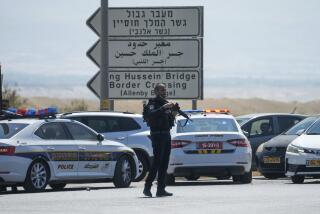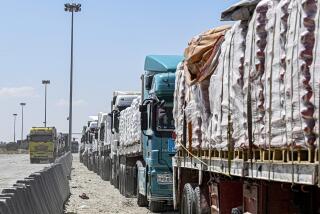Israel Kills 2 at Protest of Barrier
- Share via
JERUSALEM — Israeli troops shot and killed two Palestinian demonstrators Thursday as violent protests flared at a construction site for the barrier Israel is building in and around the West Bank.
In a further sign of growing tensions, machine-gun fire rang out as Israeli troops temporarily sealed off Palestinian Authority President Yasser Arafat’s compound in the West Bank city of Ramallah for the first time in more than a year. The Israeli soldiers pulled back after restricting access to the compound for about six hours.
The two confrontations -- coming a day after Israeli troops raided banks in Ramallah to seize what they said were millions of dollars in funds destined for Palestinian militant groups -- marked a pronounced shift after many months during which engagements in the West Bank were primarily between Israeli troops and the Palestinian militants they were seeking to arrest or kill.
The clashes also came a day after the U.S. State Department criticized Israel for what it said was excessive use of military force in the West Bank and Gaza Strip. It also faulted Palestinian militant groups for mounting suicide attacks against Israeli civilians, and Palestinian leaders for failing to act to contain the groups.
Arafat has been confined to his headquarters for nearly two years. The Israeli military said the midafternoon exchange of gunfire in the area came after a Palestinian used the adjacent Interior Ministry as a sniper’s nest.
Israeli authorities said one arrest was made during the Ramallah standoff, and Palestinian witnesses said a Palestinian policeman was shot in the face there by Israeli troops, under unclear circumstances. The Israeli army said a Palestinian was shot after throwing a firebomb at troops, but it was unclear whether it referred to the same man.
The injured policeman was reported to be in serious but stable condition. No Israeli casualties were reported in the encounter.
Among Palestinians, a wave of anxiety follows any Israeli move that could be interpreted as a prelude to direct action against Arafat.
Israeli Prime Minister Ariel Sharon’s government last year asserted its right to “remove” Arafat when it chose to -- the implication being that the Palestinian Authority leader could be either expelled or killed. Israeli officials acknowledge that such a step would provoke an explosion of violence.
Israel considers Arafat the driving force behind the 41-month-old Palestinian uprising, or intifada, in which more than 800 Israelis and 2,700 Palestinians have been killed.
The spike in violence in the West Bank followed a firefight early Thursday at the main crossing between the Gaza Strip and Israel, in which an Israeli military reservist and two Palestinian gunmen were killed.
In the West Bank village of Biddu, the two Palestinian deaths were believed to be the first in connection with the Israeli barrier.
All week, Palestinians have held government-sponsored demonstrations at points along the barrier’s route, timed to coincide with a hearing that began Monday at the International Court of Justice in The Hague. The hearing adjourned Wednesday.
Though several of the marches became chaotic stone-throwing confrontations, none had taken a lethal turn.
In Biddu, demonstrators said several hundred Palestinians tried to approach an area where Israeli bulldozers had been clearing land for the barrier. As they neared the site, Israeli troops closed in, they said.
“They fired tear gas and chased us with their jeeps,” said Mahmoud Ali Daoud, of nearby Beit Duqqo. “They opened fire at us, live fire.”
The two slain men were identified as Mohammed Khader Rayyan and his cousin Mahmour Ali Daoud, both in their mid- to late 20s.
The army said the soldiers used only nonlethal means -- rubber-coated steel pellets and tear gas -- to disperse a stone-throwing mob. It also said Arafat and his aides were not the target of operations.
A military source said soldiers returned “pinpointed fire” after being shot at and secured the area only long enough to determine there was no further threat.
More to Read
Sign up for Essential California
The most important California stories and recommendations in your inbox every morning.
You may occasionally receive promotional content from the Los Angeles Times.













